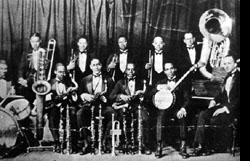

|
|

| Coleman Hawkins was the first great jazz soloist on saxophone in Jazz History(Except maybe for Sidney Bechet, who played soprano more in a heavy clarinet-like way). Although the tenor sax would be his main instrument Hawkins had a little side career on Bass-saxophone as well. After his first real professional experiences with Mamie Smith and her Original Jazz Hounds he landed in Fletcher Henderson's recording band (1923) where at that time the Bass-lines usually were played, rather nice, one might add, by Billy Fowler on his Bass-saxophone. The line-ups on these recording dates are not very well documented but on aural evidence it looks like Fowler and Hawkins on occasion exchanged their instruments. This is especially the case in 2 sessions from August 9. and September 13. 1923 when the same numbers were recorded for two different labels. The first session certainly has Hawkins on tenor, but on the second one the tenor has a lot more lighter sound and the Bass-sax has that deep dark quality that always used to be Hawkins trademark. In 'Dicty Blues' the Bass-lines gain a boogie-woogie like feel and a lot of invention. When a second clarinet is needed in the arrangement, for a short while the band plays without Bass which hints in the direction that Hawkins doubled on Bass and clarinet here. After Billy Fowler left Henderson's organization the lowest lines usually were played on tuba but Hawkins sometimes did play Bass saxophone in a variety of roles. In 'Cold Mamas' (1924) it is a humorous duet with Don Redman on Goofus, alas not very well in tune. 'Carolina Stomp' (1925) is almost a feature for Bass-sax, also in a kind of comical way. The lasts month's of 1925 had the most recordings with Hawkins on the Leviathan of saxes. 'Spanish Shawl' has it as bass in the rhythm section, 'Peaceful Valley' only has a tasteless break at the end but 'Nobody's Rose' has a nice solo. Absolute highlight in Hawkins career with his Bass-sax is in the september 1927 (paramount) version of 'Hop Off'. Here he improvises a sparkling bass line under a nice arrangement, with a lot of swinging and interesting fills. Sometimes Hawkins was struggling with his doubles, maybe caused by taking up a cold instrument after playing tenorsax most of the time, but in 'Hop Off" and 'Old Black Joe's Blues' from 1928 he is really in command, playing in tune, swinging and with a great dark tone quality. After this, the Hawk seldom took up the Bass-sax, with one notably exception, the 1931 recording of 'Clarinet Marmalade' where he plays an extremely swinging final break at almost the end of the recording. (Courtesy Bert Brandsma) |